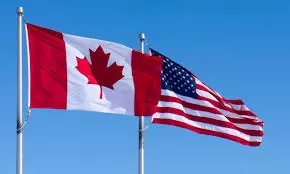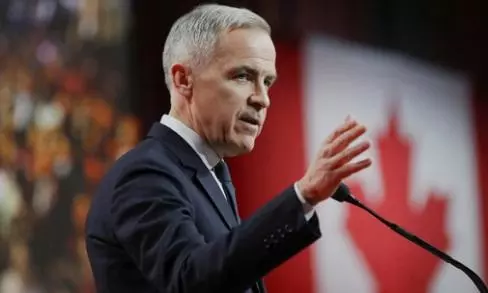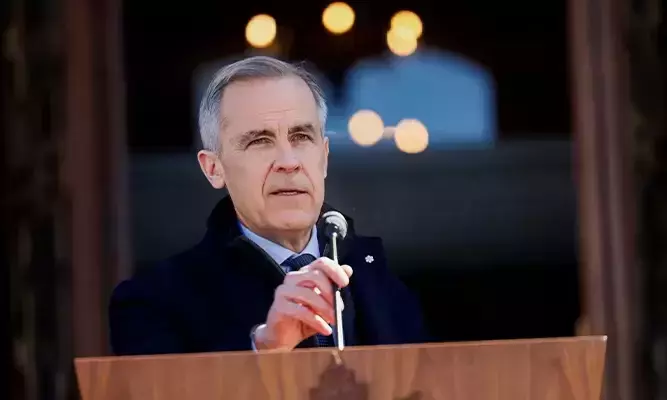
How Trump torpedoed Canada’s Conservatives
text_fieldsAs Canada prepares to head to the polls on April 28, few could have predicted the dramatic reversal of fortunes that has shaken the country’s political landscape — and captured the attention of foreign observers, especially in India. What began as a likely Conservative sweep under Pierre Poilievre has become a stunning Liberal resurgence, fuelled not by domestic scandal or policy missteps, but by an unlikely source: Donald Trump.
For many Canadians, Pierre Poilievre’s sharp rhetoric, anti-establishment tone, and social media swagger once looked like a winning formula. He was the polished populist: eager to take on the elites, hostile to “wokeism,” and promising to slash government fat. Yet his greatest strength — a campaign style often likened to Trump’s — has turned into a fatal liability.
Trump’s return to the White House and his sudden tariffs on Canadian exports, coupled with threats of economic coercion and annexationist innuendo, provoked a nationalist backlash in Canada. Poilievre’s failure to confront Trump directly — despite portraying himself as a champion of Canadian sovereignty — made him appear weak and ideologically tethered to America’s political right. His silence spoke volumes. And Canadian voters, many of whom value their country's distinct identity, listened.
The result? A collapse in Conservative support and a wave of momentum for the newly installed Liberal leader, Mark Carney. The former central banker and UN climate envoy has not only revived his party’s fortunes, but is now projected to lead it to a comfortable majority.
But this is not merely a story of Canadian electoral dynamics. India, too, has been closely observing — and for good reason.
Relations between India and Canada have been tense since Prime Minister Justin Trudeau publicly accused Indian agents of involvement in the killing of Hardeep Singh Nijjar, a Khalistani separatist, in British Columbia. The fallout was swift: diplomatic expulsions, frozen trade talks, and a near-total halt in bilateral cooperation.
With Trudeau gone, both Carney and Poilievre had signaled openness to resetting ties. Carney has called India “a democratic partner and an essential trading ally”. Poilievre, too, criticized Trudeau’s handling of the Nijjar affair and promised a more “professional and respectful” approach. While Indian officials reportedly welcomed Poilievre’s pragmatism, recent reports suggest New Delhi is now reevaluating — with interest — the Carney-led Liberal revival.
The sizable Indian diaspora in Canada — now playing an increasingly visible role in national politics — also makes this election significant. Several Indian-origin candidates are running under Liberal, Conservative, and even fringe party banners. Their visibility reflects the growing influence of South Asian communities in Canada’s political life and how domestic debates in one democracy often echo far beyond its borders.
That said, for many across the Global South, including in India and Palestine, this election also reaffirms a sobering truth: when it comes to global justice, neither of Canada's leading parties offers meaningful hope for Gaza. Both the Liberals and Conservatives have backed Israel's war narrative. However, there remains a clear difference in tone and commitment to international law. A Carney-led Liberal government is more likely to respect multilateral norms, human rights obligations, and global institutions — even if it stops short of directly challenging Western consensus on Gaza.
Ultimately, the Canadian election reminds us of how deeply globalized politics have become — and how the rhetoric of one powerful figure, sitting in the White House, can disrupt narratives far beyond his own borders. Whether Carney or Poilievre wins, the world — and the Global South — will be watching.
Ultimately, this election is more than just a contest between two Canadian parties. It’s a referendum on how much influence a foreign populist — even one sitting thousands of kilometers away in Washington — can wield over another democracy. Pierre Poilievre’s silence in the face of Trump’s provocations revealed not just political misjudgment, but a deeper unease about where Canada's right wing is heading.
Canada’s political crisis may have been triggered by an American president. But its resolution, and what follows, will ripple across borders.




















